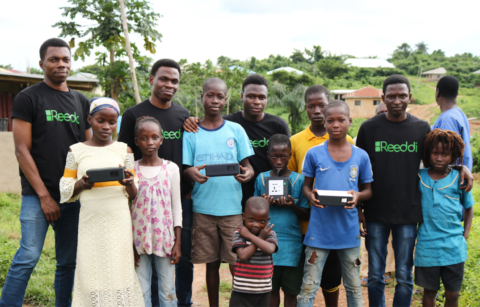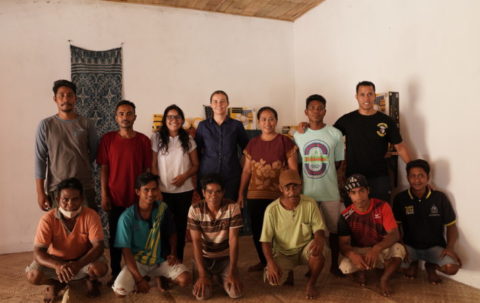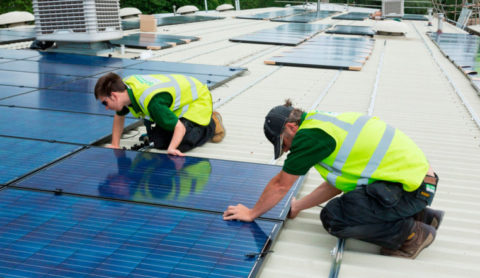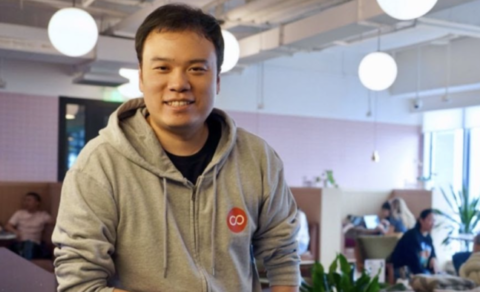Despite less than ambitious climate action at COP26, renewable energy records are still skyrocketing. Additions of renewable power capacity are on track to set yet another annual record with almost 290 gigawatts commissioned this year alone. That’s 3% higher than 2020’s already exceptional growth!
Now more than ever we need to invest in innovation that will spread the benefits of 100% clean energy to 100% of the population.
That’s where New Energy Nexus comes in. With an expertise in launching and growing startups, we equip entrepreneurs with the right resources at the right time, leveraging our global network of people and institutions to accelerate startups with climate solutions.

“Our goal is to make energy access as easy as buying milk,” says Olugbenga Olubanjo, CEO of Reeddi.
From corner stores dotted around Nigeria, customers can now pay a small fee to rent a Reeddi “capsule” and use it to plug in lights, mobile phones, laptops, fans, or other devices. When the power runs out, they bring the battery back to be recharged. It’s a way to make solar power more affordable for people who can’t easily afford the upfront cost of installing solar panels, or who don’t have access to a roof. It’s no wonder Reeddi was selected among the 15 finalists of the inaugural Earthshot Prize in 2021 – one of the most prestigious global environment prizes in history.
“My message to young women around the world would be to ask for support. Ask stupid questions. Be curious. And don’t let your dreams fade.”
Monika Jha saw the social effects of energy poverty up close: the lack of reliable street lighting made it unsafe to go out at night especially for women, theft was abundant and emissions were high. She began building a solution to these problems in her final year of college where she was studying electrical engineering. Enter Cydee: a patent-filed lighting concept that can help reduce costs by 40% and energy consumption by 30%. Three Cydee lights can replace five conventional LED lights.
Batteries are going to be crucial for electrifying automobiles, but did you know that only 5% of electric vehicle batteries are actually recycled?
Founded by Steven and Zora Chung of California, ReJoule is making it cheaper and more efficient to reuse these batteries. Enter ReJoule Energy, which has an innovative solution to rapidly test batteries. They make our clean energy future a possibility by ensuring batteries are more reliable, safer, and longer-lasting. ReJoule’s prototype is a lightweight, desktop computer-sized device that can diagnose in less than five minutes, and as little as 30 seconds, whether a battery is suitable for a second life.
A start-up with a focus on inclusive and sustainable innovations in Sumba Island, in Indonesia, Sumba Sustainable Solutions (3S) provides local schools, villages and community health centres with access to solar power. In the past, over 500,000 families living there—roughly 38% of the island’s population—struggled with little or no electricity. The distribution of solar-powered lighting solutions has significantly improved productivity and livelihoods.
“Before we started with the New Energy Nexus accelerator, we were just dealing with problems as they came up, feeling like there must be a better way. With New Energy Nexus’ guidance, we now have a clear plan for all parts of the business and our whole team is committed to achieving the goals that we have set together,” says Rambu Yati Radandima, a finance manager at 3S.

In rural Uganda, Community-Based Organisations (CBOs) provide many essential services – supporting better health, education, sanitation and work for local people. New Energy Nexus Uganda partners with these locally structured, small organisations to bring affordable renewable energy to the country’s remote (or last-mile) villages. So far, we have incubated 123 small clean energy enterprises across Uganda and created 650 jobs, 70% of which are occupied by women.
“Thanks to [this] growth fund, we expanded our clean energy business from selling clean energy products to just 5 groups to now operating in over five districts in the northern part of Uganda. 17 out of 30 people in each of our groups have either a pico system or a cookstove,” says one CBO partner, David Olodi, Director and Founder of Agri-Light Limited.
To address climate change, energy generated from solar power needs to grow from the current 3% to 60% or more. The bottleneck to meeting this goal is in the production of key components, such as silicon wafers.
Leap Photovoltaics aims to reduce costs and accelerate production with solar panels that eliminate silicon wafers. While they are just at the beginning of their entrepreneur journey, they are already working with Lawrence National Laboratory and the University of California, San Diego to test components of their design. If successful, their innovative technology could save more than 100 gigatons of emissions by the middle of the century.


Financial services also have a role to play in helping consumers make climate conscious choices. Enter Dodo: an all-in-one platform that helps companies to rapidly measure their emissions and access green, affordable finance, and also winners of inaugural Climate Fintech Cards & Payments Challenge (C&P Challenge). Dodo was launched by co-founders Jack Kennedy and Csaba Szabo to enable SMEs in the UK to reduce their emissions. SMEs account for over 50% of the UK’s carbon footprint, but Dodo aims to help them understand their carbon footprint, and accelerate the transition away from fossil fuels.
“When questioning myself about why I am here, I find the answer in promoting social progress and making the world a better place” – Felix Wu, CEO and Founder of Seniverse.
Clean energy consumption is a crucial step in decarbonising the global economy. Enter Seniverse: a world leading big data company, leveraging satellite data, artificial intelligence, machine learning and IoT to deliver asset-level physical risk predictions on a computing platform. These data help predict power generation in order to increase efficiency of solar and wind farms and guide utilities with electricity load forecasting. This China-based startup is a member of New Energy Nexus’ second EXCEL Accelerator cohort.
The team at Seniverse has been in the industry for over a decade working with clients such as the State Grid Corporation of China, Gold Wind, Nio and Starbucks in China.
